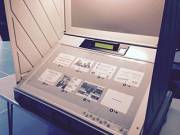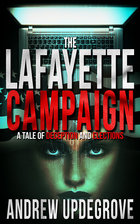 Now that’s an intriguing question, isn’t it? Just about every other computerized process has proven to be vulnerable, and as voting becomes even more technology based, it becomes increasingly vulnerable as well. Computer systems are generic processing hosts, and to a computing platform, data is simply data. The fact that certain information tallies votes rather than credit card transactions does not make it any harder to hack. Moreover, the U.S. has a long history of documented voting fraud, so there’s no reason to assume that politicians, and their backers, have suddenly become paragons of virtue. Indeed, there’s plenty of evidence to the contrary.
Now that’s an intriguing question, isn’t it? Just about every other computerized process has proven to be vulnerable, and as voting becomes even more technology based, it becomes increasingly vulnerable as well. Computer systems are generic processing hosts, and to a computing platform, data is simply data. The fact that certain information tallies votes rather than credit card transactions does not make it any harder to hack. Moreover, the U.S. has a long history of documented voting fraud, so there’s no reason to assume that politicians, and their backers, have suddenly become paragons of virtue. Indeed, there’s plenty of evidence to the contrary.
When you come down to it, the only thing that’s different today is that altering votes might be easier, and that those motivated so do so may be harder to catch. So why aren’t we hearing more about that risk?
Another good question. But before we explore it, let’s add a few more observations to the pile.
First of all, governmental entities, from national agencies to local municipalities, are notorious for using outmoded technology, and for being late adopters of appropriate controls to protect citizen data. Laptops with personal health information on board get stolen, and government web sites have even displayed social security numbers openly. [Update 7/10: The federal government announced that extensive background check information for over 21.5 million individuals had been hacked.]
So why should we assume that the hundreds of thousands of voting station in tens of thousands of locally managed voting precincts, or the telecommunications pathways used to transmit voting results to state electoral authorities, or the systems where this data is aggregated and from which it is reported, are all state of the art secure throughout all fifty states?
But wait, you might say, no one could pull off a national hack and get away with it. There are too many states with independent electoral commissions, and too many different voting systems in use within a single state. All of which is true. But when you recall that the U.S. vote is determined by adding up winner take all results in all but two states (where electoral votes are apportioned by the percentage of the vote that each candidate receives), hacking just a few electoral districts swing an election.
Some would say that this is exactly what the Supreme Court did when it ruled that questions relating to a few thousand votes in southern Florida would not be reexamined. The result? George W. Bush, and not Al Gore, became the president. The same result could have been achieved in a more covert fashion by taking control of the voting stations in just a few precincts.
Still too farfetched for your tastes? Well, consider that John Kennedy became president over Richard Nixon in 1960 in a similarly narrow victory where serious voter fraud was alleged to have occurred in multiple states, including Texas and Illinois, states which Kennedy carried very narrowly. Had Nixon taken them instead, he would have been taken office rather than Kennedy. So that makes two presidential results in fifty years that could have been reversed by tampering with as little as ten or twenty thousand votes.
Moreover, one can imagine that voting fraud vulnerability will increase rather than lessen. How long will it be, do you suppose, before we’ll be able to vote in advance from our home computers, or via a phone app? Never? I doubt it.
Which brings us back to the question of why we don’t hear more about this risk. Perhaps the best answer is that we’d rather not think about problems that are expensive, or complicated, or even just plain inconvenient, until we have to. What usually brings us to that pass is a disaster, rather than prudent fore thought. Like rampant breaches of major retailers resulting in the theft of the personal payment card data of millions of voters. Or the realization that someone just stole a presidential election.
As you might guess from the above, I’ve spent some time thinking about this vulnerability. In fact, I’ve even taken the time to write a book describing exactly how it could be done.  That book is called The Lafayette Campaign, a Tale of Deception and Elections. It came out last week, and already it’s proving to be disturbingly prescient. For example, the first thing people notice is that extremely improbable candidates immediately jump to the top of the polls over far more credible candidates. Does this indicate someone is hacking the polls?
That book is called The Lafayette Campaign, a Tale of Deception and Elections. It came out last week, and already it’s proving to be disturbingly prescient. For example, the first thing people notice is that extremely improbable candidates immediately jump to the top of the polls over far more credible candidates. Does this indicate someone is hacking the polls?
Hmmm. Did you read this morning that Donald Trump is leading the opinion polls, outpointing far more credible candidates like Jeb Bush?
Kind of makes you think, doesn’t it?
If you enjoyed reading my first book The Alexandria Project, I think you’ll enjoy The Lafayette Campaign as well. Like the first book, everything it describes could actually occur – but hopefully won’t.
You can find it in eBook and print versions at Amazon. Why not give it a try?